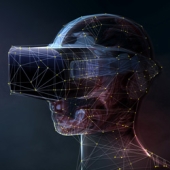IN BRIEF
- 4:36 - One of the things I am most excited about with the concept of the metaverse is the fact that it will reduce borders. It will allow people anywhere in the world to have access to others anywhere in the world in order to explore, to research, to develop.
- 13:12 - I find in the companies that do lean in and are in a good position to start using and leveraging this technology, the leaders are experiencing and the leaders are also encouraging their team members to take time, to take time each week to try something different.
- 16:14 - Our work will be completely redefined. It will not be a nine-to-five. We will work when we feel we need to, when we feel it’s part of our mission, when it’s part of our passion.
Joe Kornik, Editor-in-Chief of VISION by Protiviti, caught up with Jennifer Vessels, a futurist, transformation advisor, CEO of Next Step and founder of Executive Growth Alliance, an innovation eco-system of top companies, to discuss how we’ll work in the metaverse future. Vessels has worked with Adobe, Cisco, Google, Genentech, GE, Novartis and many others where she advises executives on how to leverage the latest digital, technological and societal trends, including Web 3 and the metaverse, to make their companies future-ready.
How we’ll work in the metaverse with futurist Jennifer Vessels, CEO of Next Step - video transcript
Joe Kornik: Welcome to the VISION by Protiviti interview. I’m Joe Kornik, Editor-in-Chief of VISION by Protiviti, a global content resource looking to the future to examine big themes that will impact the C-suite and executive boardrooms worldwide.
Today, we’re exploring the metaverse and its future impact, and I’m excited to be joined by Jennifer Vessels, a futurist, transformation advisor, CEO of Next Step, and founder of the Executive Growth Alliance, an innovation ecosystem of top companies. Jennifer has worked with Adobe, Cisco, Google, Genentech, G.E., Novartis, and many others where she advises executives on how to leverage the latest digital, technological, and societal trends, including Web 3 and the metaverse, to become future-ready. Jennifer, thank you so much for joining me today.
Jennifer Vessels: It’s great to be here. I’m looking over to our discussion.
Joe Kornik: Yes, me too. The idea of future-ready is what VISION is all about, so I’m really excited to talk to you today about the metaverse and how companies can leverage it to become future-ready. I’ve read all sorts of forecasts, and I’m sure you have as well about the metaverse and what it all means to the global economy over the next decade or so. What do you think ultimately will be its impact and when will we see that impact?
Jennifer Vessels: I believe it will have a significant impact in the next one to eight years, in particular, and part of that comes from just looking at the way society is evolving. If we think back 30 years ago at 1992, which seems like a long time ago but really 30 years is not that vast, at that time that was really the beginning of the internet as we know it and what I would call Web 1 that allowed us to communicate with people in minutes as opposed to days or weeks to send communications. That evolved over 10 years to Web 3 or the World Wide Web, which is basically what we’ve been using over the last 20 years that has, I believe, fundamentally changed the way business works. It certainly changed the way each of us as individuals live, shop, access entertainment, travel, experience one another, and we really saw that during the pandemic that the World Wide Web was our lifeline.
Through the last five years, a new infrastructure has evolved, building on what we have today but progressing to Web 3, a new evolution that allows for more immersive experience, not just reading, not just looking, but experiencing. That takes everything that we’ve learned through gaming, takes the AI capabilities that have been developed, takes what we know about human behavior, and brings it into a whole new level, which is what I find is referred to as the metaverse where we can interact through digital tools in a new way. That is built on this Web3 infrastructure, which is a redesign of the internet using cryptography, using very advanced algorithms to allow people securely to be able to digitally connect, interact, transact, and conduct business. That I believe will become more and more prevalent in all organizations over these next one, five, eight years such that when we get to, let’s say, 2030, the metaverse-type of environment will become an integral part, possibly the entire part, of many organizations, industries and the way we work.
Joe Kornik: You described yourself as a future-ready innovator and a futurist and you’re exactly the type of person that we need, that we should be talking to for this particular topic, the exact type of person that we need to offer us some insight as to where this is all going. How will we work in the metaverse? What do you think is possible? What do you see businesses doing to enhance their brand in the metaverse?
Jennifer Vessels: One of the things I am most excited about with the concept of the metaverse is the fact that it will reduce borders. It will allow people anywhere in the world to have access to others anywhere in the world in order to explore, to research, to develop. There is a concept in use today in a lot of advanced corporations of a decentralized autonomous organization or a DAO. Think about IKEA as an organization that is developing future-ready textiles based on sustainable products. They can now not only have people working in Sweden, but easily have people that commit on a shared contract with shared ownership in the Philippines, in Africa, in Poland, in Turkey to develop new capabilities. The concept of the metaverse and Web 3 will allow a more secure way of interacting with people outside of the borders of location or even corporations. These can be new ways of extending the concept of a skunk works, let’s say, allowing for more diverse values.
Now, that also brings up a number of questions around governance that honestly have not been fully explored or any standards developed of, what are taxation requirements? What does ownership mean? There are a lot of these questions that need to be explored but I think will fundamentally change the way we look at how we do business with one another.
The other aspects are just around areas such as, for example, education. Education up until today is still a very traditional way of having either students in K through 12 or adults coming into a corporation, sitting into a room and listening to people talk about what you should do. Through Web 3 and metaverse types of applications, people can experience. On-the-job training can be done from one’s living room before they start the job. They can be experiencing and role-playing and dialoguing and working with a digital twin of the kind of equipment they will use. Children will go to school from wherever they are, experiencing what it was like to be in the world of the dinosaurs, to live through periods of apartheid, so it will fundamentally change our understanding because we will have a different level of experiential education for people coming into the workplace but also in the workplace itself.
The other area that I believe will fundamentally change is the concept of finances. Today, in our capitalistic society, everything is about an exchange for money. As we move into metaverse Web 3, the type of exchanges that we do are more towards tokens, which could be a bitcoin. It could be this concept of an NFT, a non-fungible token that allows you to exchange a representation of something. Maybe there are ways that we can leverage tokens that go back to sustainability. I think over time, maybe 10, 20, 30 years, that our concept of value and how we exchange value for products and services can evolve in whole new ways by getting out of this concept of dollars versus euros and borders and structures. It’s a much more open, embracive and diverse way of exploring and working together.
Joe Kornik: What other industry sectors or disciplines do you think will be most enhanced by the metaverse?
Jennifer Vessels: I think across all sectors, the customer engagement will be broadened significantly because as customers, we will have access to anything, anywhere. The financial sector will shift completely, where banks, as we know it, financial institutions will need to embrace a new role of helping people redefine wealth, helping people redefine their options and transactions. Education, we talked about. Manufacturing will evolve. We’ve just only begun to start a tiny little bit on things like 3D printing, but think about the ability to be able to have anything you want created wherever you want it. Heavy industries such as oil and gas, some of the sea exploration, even farming—concepts where we used to have people go out on the platforms in very dangerous conditions, we can minimize that today by having digital twin so people can be in a safe, secure environment while controlling the fertilizer that’s going into the ground or the type of pumping that’s happening in the subsea station.
It will fundamentally change I think the way we all interact with one another, with business, with finance, and with the planet, but one thing that I do want to point out is, while I talk about these changes with technology doing more and more for us, I believe it’s going to make the concept of people and the value of people even more important because technology is that platform. It is the foundation of the park. The swing sets and the tools on the playground, they are the tools that in order for us to experience and evolve, we as people need to develop our unique skills of communication, of problem-solving, of understanding how to leverage these tools, understanding how to bring people into the environment. I believe there is an increasing role of need for high people skills while we relegate some of the more mundane, some of the more dangerous, some of the more challenging fundamental physical processes to the technology.
Joe Kornik: Right now, business leaders I know are struggling with, as they think about the metaverse, all of them are sort of being confronted with the metaverse and being asked about the metaverse or where their business is going in the metaverse. I’m curious, your thoughts on how business leaders should be investing in people and resources, how they should measure ROI on those investments. Where should they start and what should they be worried about? What are the red flags that they should be looking at along the way?
Jennifer Vessels: The biggest red flag would be to sit on the sidelines and wait and see, which is, I think for a lot of people, the first tendency. The best thing that a leader can do is to indeed lean in and embrace the concepts, not only research and listen to a webcast and interviews but actually start trying something. Get a pair of 3D glasses, whether it’s Quest or Oculus or whatever it is. If you have young people in your life, they’re using those kinds of tools. They’re in gaming. Jump in and play with them, begin to experience. Set up a digital wallet. It doesn’t matter which type of bitcoin or cryptocurrency, but the experience of setting that up, go into a Web 3 application and purchase. For a small amount of money, purchase an NFT, sell it to somebody, just to get the experience, because this is the kind of environment that you need to embrace. It’s immersive. You’re going to learn by trying.
I find in the companies that do lean in and are in a good position to start using and leveraging this technology, the leaders are experiencing and the leaders are also encouraging their team members to take time, to take time each week to try something different. Encouraging lunch-and-learns, web sessions, let’s experience and let’s explain and let’s work together on what we’re learning because this is a whole new world and the only way you can get there is to go through.
Talk to your customers. Talk to your customers about what they want. Are there areas where you could possibly start doing some immersive training with those new hires? The digital natives that are coming into the workplace now, anyone under the age of 35, they’re going to demand access to these kinds of tools, so start with them. And that can be in on-the-job training. It can be in marketing to those folks. Talk to your marketing teams about creating an NFT that could be used in some of the social media outreach, a great way of engaging the younger consumers.
Start small. Start small, try something, explore, experiment. I believe the next one to three years is going to be a very exciting time, a time when we’re all learning and learning together so that in five to 10 years, we really have that opportunity to embrace and use what we’ve learned to move forward in a whole new future-ready society.
Joe Kornik: Jennifer, I have one more question. You’ve been very generous with your time today, so I appreciate that. I think it’s a fun question. You just referenced the one-to-three-year window get us ready for the five-to-10-year window. I’m wondering if you could even go out further than 10 years and take us out a decade or more and tell us something about the metaverse and its overall impact.
Jennifer Vessels: Well, considering the speed of technological growth when we look at things like AI and the ChatGPT and a lot of these technologies, I would say in another 10 to 15 years, let’s say in 2035, 2040, we will look back to these conversations and say, “Wow, we were very, very antiquated.” At that point, I would envision that we will be able to reach anyone, anywhere. Travel will be redefined completely. We will have access to experience the beach even in the midst of massive rainstorms. It will be a special experience to go and be in a physical environment. Our work will be completely redefined. It will not be a nine-to-five. We will work when we feel we need to, when we feel it’s part of our mission, when it’s part of our passion. We will no longer measure ourselves by exactly what’s in our bank account, but by what our impact is on the planet and we will have access on a global basis to the right resources, whether it’s healthcare when we need it, whether it’s education for our children, whether it’s new opportunities or new research capabilities that will be available to us.
Now, there may be some people that choose to stay in only the old physical environment and that’s okay, but for those that really want to embrace, I believe, will be able to have a much freer, much more integrated, much more sustainable in many ways because our work will be giving back to society and creating more value for the world but also involving the planet because that’s becoming more and more apparent that our society and the way we involve one another has to give value not just to us but on a broader scale.
Joe Kornik: Right. Well, it will certainly be a different world and I can only think that will be a better world.
Jennifer Vessels: I certainly look forward to that.
Joe Kornik: Thank you, Jennifer, for joining me today.
Jennifer Vessels: Thank you. It has been wonderful to be here and I’ve thoroughly enjoyed our dialogue, and I look very, very forward to seeing you again somewhere in the physical world or in the metaverse over these next decades.
Joe Kornik: It might be our avatars meeting up for a coffee somewhere in the metaverse [laughter]. Thank you for watching. For Jennifer Vessels, I’m Joe Kornik. We’ll see you next time.
Did you enjoy this content? For more like this, subscribe to the VISION by Protiviti newsletter.



































